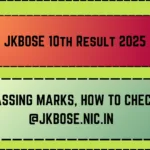The Karnataka Secondary Education Examination Board (KSEEB) conducts the SSLC (Secondary School Leaving Certificate) exams annually, a crucial milestone for students in Karnataka. With the 2025 exams around the corner, understanding the passing marks and subject-wise requirements is essential. This guide breaks down everything you need to know, from minimum passing scores to expert tips for acing the exams. Whether you’re a student or a parent, this article will help you navigate the KSEEB SSLC 2025 with confidence.
Key Highlights 🗓
| Point | Details |
|---|---|
| Organization Name | Karnataka Secondary Education Examination Board (KSEEB) |
| Exam Name | SSLC (Secondary School Leaving Certificate) |
| Exam Year | 2025 |
| Total Subjects | 6 (Including 1st and 2nd Languages) |
| Passing Marks | 35% in each subject, 35% overall aggregate |
| Exam Duration | 3 hours per subject |
| Result Declaration | May 2025 (Tentative) |
| Official Website | kseeb.kar.nic.in |
Understanding KSEEB SSLC Passing Marks 🗓
What Are the Minimum Passing Marks?
To pass the KSEEB SSLC Exam 2025, students must score at least 35% in each subject and maintain an overall aggregate of 35%. This means even if you score below 35% in one subject but manage to compensate with higher marks in others, you won’t pass.
For example, if a student scores 30% in Mathematics but 40% in Science, they’ll need to reappear for the Mathematics exam. This rule ensures students maintain a balanced performance across all subjects.
Subject-Wise Passing Marks Breakdown 🗓
Here’s a detailed table showing the subject-wise passing marks for the KSEEB SSLC Exam 2025:
| Subject | Total Marks | Passing Marks (35%) |
|---|---|---|
| 1st Language (Kannada) | 100 | 35 |
| 2nd Language (English) | 100 | 35 |
| Mathematics | 100 | 35 |
| Science | 100 | 35 |
| Social Science | 100 | 35 |
| Optional Subject | 100 | 35 |
Real-Life Examples of Scoring Strategies 🗓
Case Study 1: Rohan’s Success Story
Rohan, a 2023 SSLC topper, shared his strategy: “I focused on weak subjects first. For me, it was Mathematics. I practiced at least 2 hours daily and solved previous years’ papers. This helped me score 85% overall.”
Case Study 2: Priya’s Improvement Journey
Priya struggled with Science but excelled in Languages. She dedicated extra time to Science, joined a study group, and used visual aids like diagrams and charts. Her efforts paid off, and she passed with 42% in Science.
Expert Insights on Scoring Well 🗓
Tip 1: Focus on Weak Areas
According to Dr. Anitha Rao, an education consultant, “Students should identify their weak subjects early and allocate more time to them. Consistent practice and seeking help from teachers can make a huge difference.”
Tip 2: Time Management is Key
Mr. Suresh Kumar, a veteran teacher, advises, “Create a study schedule that covers all subjects. Allocate more time to challenging topics and revise regularly.”
Research-Backed Data on Exam Performance 🗓
A recent study by the Indian Journal of Education revealed that students who practiced previous years’ question papers scored 15% higher than those who didn’t. Additionally, students who maintained a consistent study routine performed better under exam pressure.
How to Calculate Your Aggregate Score 🗓
Calculating your aggregate score is simple. Here’s how:
| Step | Action |
|---|---|
| Step 1 | Add marks obtained in all 6 subjects. |
| Step 2 | Divide the total by 6. |
| Step 3 | Ensure the result is 35% or above. |
For example, if a student scores:
- Kannada: 40
- English: 50
- Mathematics: 35
- Science: 45
- Social Science: 40
- Optional Subject: 50
Total Marks = 260
Aggregate = 260 ÷ 6 = 43.33% (Pass)
Common Mistakes to Avoid 🗓
Here’s a table highlighting common mistakes students make and how to avoid them:
| Mistake | How to Avoid |
|---|---|
| Ignoring Weak Subjects | Focus more on subjects you find difficult. |
| Last-Minute Cramming | Start early and revise regularly. |
| Skipping Past Papers | Solve at least 5 years’ question papers. |
| Poor Time Management | Create a study schedule and stick to it. |
| Neglecting Health | Take breaks, eat healthy, and sleep well. |
Final Thoughts 🗓
Preparing for the KSEEB SSLC Exam 2025 doesn’t have to be overwhelming. By understanding the passing marks, focusing on weak areas, and following expert advice, you can ace the exams with confidence. Remember, consistency and smart preparation are your best allies.
Nisha Joshi is an education content writer specializing in exam results and admit cards. With a Master’s in History and 5+ years of experience, Nisha loves crafting detailed and accurate content. She enjoys exploring historical sites.







